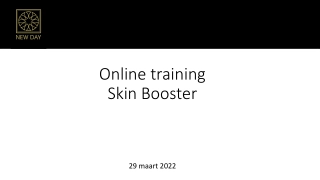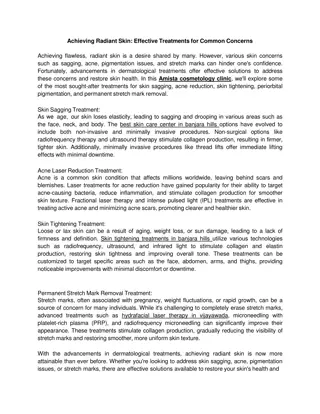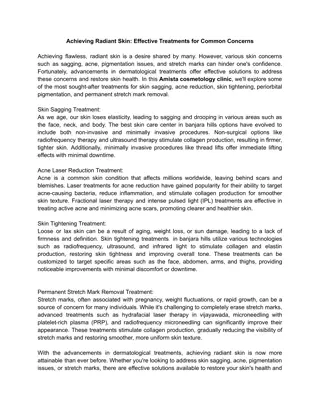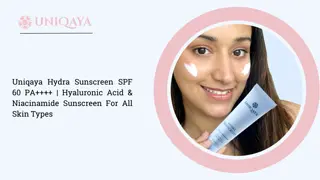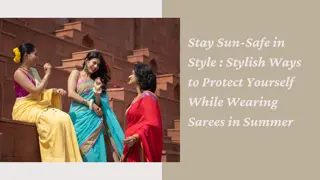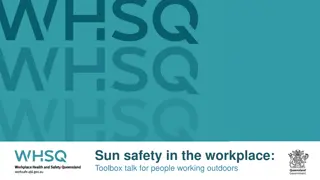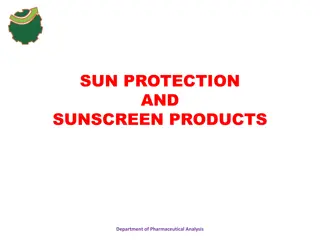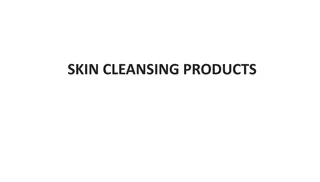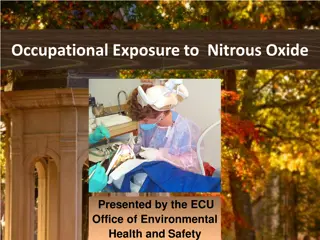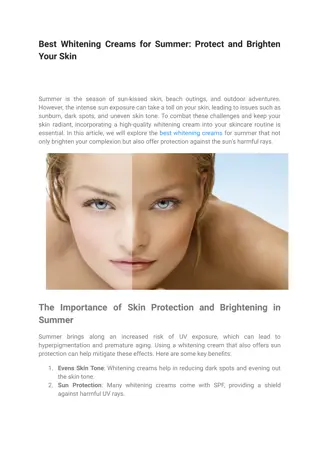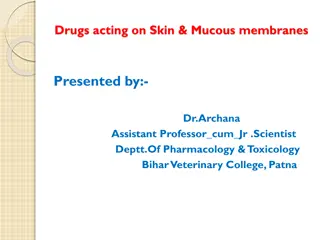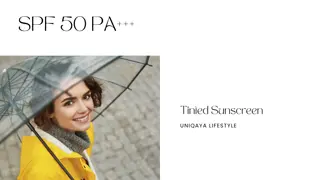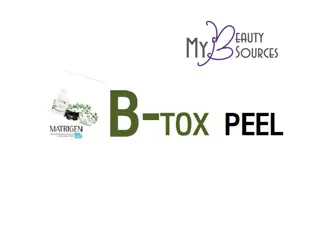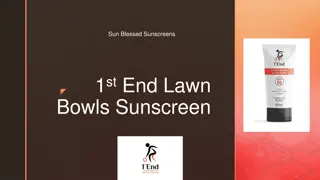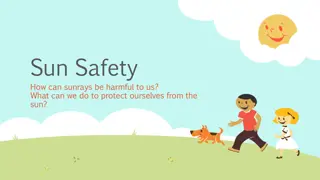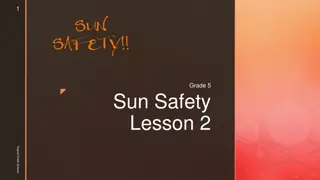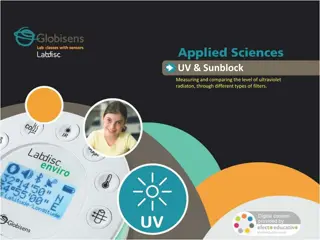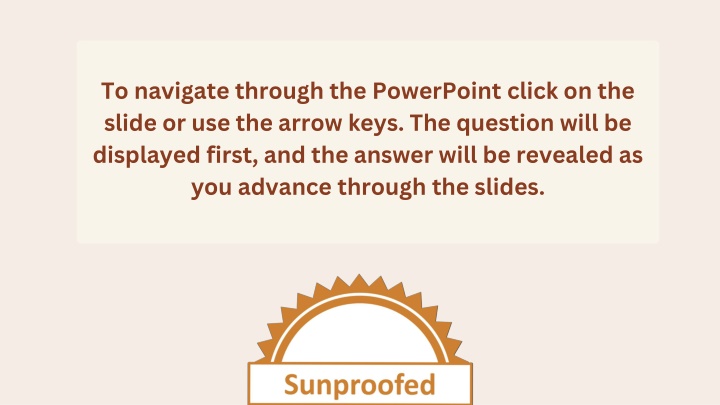
Protecting Your Skin from Harmful Sun Exposure
Learn how to protect your skin from the sun's harmful UV rays, including using sunscreen, seeking shade, and monitoring moles for signs of skin cancer. Discover valuable tips for sun safety to keep your skin healthy and safe year-round.
Download Presentation

Please find below an Image/Link to download the presentation.
The content on the website is provided AS IS for your information and personal use only. It may not be sold, licensed, or shared on other websites without obtaining consent from the author. If you encounter any issues during the download, it is possible that the publisher has removed the file from their server.
You are allowed to download the files provided on this website for personal or commercial use, subject to the condition that they are used lawfully. All files are the property of their respective owners.
The content on the website is provided AS IS for your information and personal use only. It may not be sold, licensed, or shared on other websites without obtaining consent from the author.
E N D
Presentation Transcript
To navigate through the PowerPoint click on the slide or use the arrow keys. The question will be displayed first, and the answer will be revealed as you advance through the slides.
True or False? True! The sun is strongest between 10 AM and 4 PM, which can harm your skin. When the UV index is above 3, seek shade, use clothing and apply sunscreen to protect your skin during these hours. The sun is strongest between 10 a.m. and 4 p.m. Click to reveal the answer!
True or False? True! For sensitive skin, look for sunscreens labelled as fragrance free or hypoallergenic. Test it first on the skin on your inner elbow. If your skin is sensitive or you have allergies, you should use special sunscreen. Click to reveal the answer!
True or False? True! If you get a sunburn, cool off with cold water, drink lots of water, use aloe vera, wear loose clothes, and avoid the sun. If it's really bad, seek medical advice if you notice any changes in these. If you get a sunburn, you should stay out of the sun and use soothing lotions. Click to reveal the answer!
True or False? True! Check moles or spots for ABCDE: Asymmetry, Borders, Colour, Diameter, and Evolving. Seek medical advice if you notice any changes in these. New or changing moles or spots on your skin can be signs of skin cancer. Click to reveal the answer!
True or False? False! Tanning beds aren't safer than being out in the sun. They use strong UV rays that can give you skin cancer and make you age faster. Tanning beds are safer than lying out in the sun. Click to reveal the answer!
True or False? True! Remember to put on sunscreen when the UV scale hits 3 or more, which is from March to October. However, it's a good idea to check the UV index all year round. You don t need sunscreen in the winter. Click to reveal the answer!
True or False? True! Kids sunscreen is usually high factor (>50SPF) and fragrance free - to minimise potential allergens. Teaching kids sun safety habits early helps to keep their skin healthy for life. Click to reveal the answer! Sunscreen is safe for kids to use.
True or False? False! You don t need to wear a hat if you re already wearing sunscreen. Sunscreen doesn t cover everything, like your scalp and ears. So, wearing both a hat and sunscreen keeps you safer in the sun. Click to reveal the answer!
True or False? False! UVA rays cause wrinkles, and UVB rays cause sunburn. Both can lead to skin cancer, so use a broad spectrum sunscreen to protect your skin. UVA rays make you sunburn and UVB rays make you age. Click to reveal the answer!
True or False? True! Use about two tablespoons (a shot glass) of sunscreen for full-body protection. For spray sunscreen, apply until your skin looks shiny. You should put on a lot of sunscreen to cover all your skin. Click to reveal the answer!
True or False? True! Sun safety is vital for healthy skin. It reduces the risk of sun damage like sunburn, wrinkles, and skin cancer, and it sets a great example for others! Being safe in the sun is important to keep your skin healthy. Click to reveal the answer!
True or False? True! UV rays from the sun are invisible but can hurt your skin. UV rays from the sun can t be seen, but can cause sunburn, aging, and increase your risk of skin cancer. Click to reveal the answer!
True or False? True! It s important to reapply sunscreen every two hours to keep it working well, especially if you re sweating or swimming, which can wash it away. You should put on more sunscreen every two hours. Click to reveal the answer!
True or False? False! Expired sunscreen might not protect your skin, risking sunburn. Check expiration dates and use fresh sunscreen to protect your skin from the sun. It s okay to use sunscreen that s out of date. Click to reveal the answer!
True or False? True! Wearing sunglasses helps protect your eyes from the sun. Sunglasses that block UV rays protect your eyes from harm, including cataracts and macular degeneration. Click to reveal the answer!
True or False? True! Some parts of your body can get sunburned more easily. Your face, shoulders, and back are more prone to sunburn because of how the sun s rays fall on our bodies as we walk around. Click to reveal the answer!
True or False? False! I need to spend a lot of time in the sun to get enough Vitamin D. 15-30 minutes in direct sunlight with your face and arms exposed is enough time to make vitamin D. Click to reveal the answer!
True or False? False! Tanning won t stop sunburn. It actually damages your skin, making you more likely to get skin cancer and look older faster. Getting a base tan helps you avoid getting sunburned. Click to reveal the answer!
True or False? True! Wearing light and loose clothing is best to stay safe in the sun. Wearing light, baggy clothes is a smart way to stay safe in the sun. They keep you cool and protect your skin from the sun s rays. Click to reveal the answer!
True or False? True! Always use sunscreen with an SPF 30 or higher to shield your skin from the sun s harmful rays. SPF 30 blocks 97% of the sun s harmful rays. You should always use sunscreen with an SPF 30 or higher. Click to reveal the answer!
True or False? True! Clouds don t fully block the sun s rays. Check the UV index and protect your skin if it s 3 or higher. You can get sunburnt even if it s cloudy. Click to reveal the answer!

